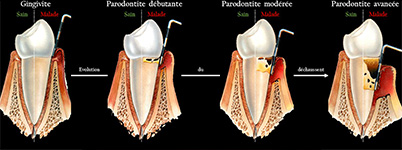A healthy and varied diet rich in vitamins and trace elements, brushing your teeth twice a day, regular sports activities and interdental cleaning will keep not only your gums healthy but also your health in general!
GingivitisGingivitis (superficial gum inflammation) is caused by the accumulation of bacteria on the teeth (‘plaque’ or ‘bacterial biofilm’). These bacteria are responsible for the production of calculus, which further flourishes when bacteria accumulate. This is when the vicious circle starts: the more bacteria on the teeth, the more calculus is produced. The more calculus, the more bacteria develop.
Patients may notice bleeding when brushing their teeth, gums becoming redder or swollen, and a recurring bad taste or bad breath (halitosis). Treating gingivitis is simple: Meticulous scaling together combined with a training on brushing techniques. These techniques must be carefully applied to prevent gum inflammation from coming back and multiples scaling sessions!
A tooth brush, dental floss and interdental brushes are your best friends!»To be preventive and to avoid the reccurence of the gingivitis, we advice one or two cleaning each year.

Untreated chronic gingivitis may lead to chronic or acute gum and jaws infection: the periodontitis. Periodontal diseases are inflammatory diseases infecting the jaw bones. There are several forms of periodontal diseases which vary according to the health conditions of the patient, the use of medicine, drugs, smoking, etc. Periodontal diseases are caused by very aggressive pathogenic bacteria developing on the calculus built up on the teeth, between the teeth and often below the gum. Pathogenic bacteria destroy tissues that support the teeth (the gum, the periodontal ligament and the alveolar bone). If these diseases are untreated a periodontal pocket can form around the tooth, which become filled with aggressive bacteria and toxins arising from their metabolism. The gum will become ulcerated and the bacteria will enter the body! If these bacteria enter the body they may cause systemic diseases or complicate other pathologies (diabetes, cardiovascular and lung diseases, polyarthritis, etc.)
To treat a periodontal disease, one must undergo meticulous root planning under local anaesthetic. This process is referred to as a pocket cleaning, or deep cleaning and serves to remove the bacteria and calculus that have accumulated on the teeth and inside the periodontal pockets. The brushing techniques instructed by your dental professional must be strictly followed to ensure the disease is eliminated and normal periodontal health is recovered and stabilised. A medicated treatment, vitamins, nutritional supplements as well as advice from your dental professional on healthy hygiene practices will further support the treatments provided in our practice.
A medical questionnaire and complementary exams may be needed in order to diagnose a general disease linked to a periodontal disease. Referral to a general practitioner or a specialist is sometimes vital for healing.
Untreated periodontal diseases can lead to teeth loss! Untreated periodontal diseases may have severe consequences on your general health! Therefore, early diagnosis and treatment are recommended. After the treatment, regular follow-up appointments and support therapy (often 3 to 4 times per year) will help to prevent the disease from becoming recurrent. >If you want to keep your gums healthy, do not smoke! (neither tobacco or cannabis)

